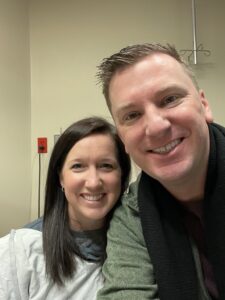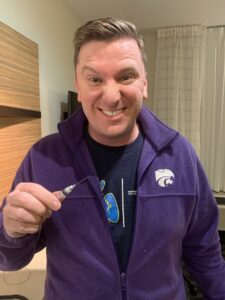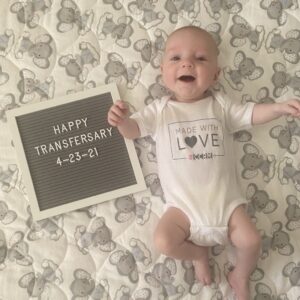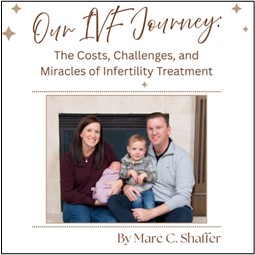By Marc Shaffer
National Infertility Awareness Month and National Infertility Awareness Week are a time to share stories, provide support, and bring awareness to the realities of infertility – both the emotional and financial toll it takes.
My wife, Bridgette, and I know firsthand how difficult the journey can be.
There are many medical avenues for dealing with infertility, based on your personal needs. Lifestyle changes, oral medications, less invasive processes or procedures, surgeries and IVF could all be considered, and the costs associated at each level will vary greatly.
For us, infertility treatment was necessary due to my issue, not my wife’s, which is the case for about 40-50% of infertility cases. Our experience led us to the Colorado Center for Reproductive Medicine (CCRM) in Lone Tree, CO, where we underwent IVF under the incredible care of Dr. Schoolcraft and his team.
A Journey That Started at the Worst Possible Time
We first attended an informational session about IVF in February 2020, just before the world shut down due to COVID-19. Like many people, we thought the pandemic would be over in a few months. It wasn’t. Travel restrictions, financial uncertainties, and general stress forced us to delay treatment longer than we expected. Finally, in 2021, we committed to the process, beginning with our first retrieval.
The Hardest Part: Retrieval and Uncertainty
 For those unfamiliar, IVF has two major phases: retrieval and transfer. While the transfer is the exciting part, the retrieval process is where most of the physical and emotional challenges occur. My infertility issue had the possibility of needing surgery. Three times, I would visit the clinic and then anxiously await results in our extended-stay hotel for a call determining if surgery was necessary. Luckily, I avoided surgery all three times, but my wife still had to endure the hardest part of the process.
For those unfamiliar, IVF has two major phases: retrieval and transfer. While the transfer is the exciting part, the retrieval process is where most of the physical and emotional challenges occur. My infertility issue had the possibility of needing surgery. Three times, I would visit the clinic and then anxiously await results in our extended-stay hotel for a call determining if surgery was necessary. Luckily, I avoided surgery all three times, but my wife still had to endure the hardest part of the process.
Our first retrieval resulted in zero viable embryos. That meant 10 days in Denver, $25,000 spent, and nothing to show for it. It was crushing. But after regrouping, we made the difficult decision to try again.
The Costs: A Reality Check
According to the article How Much Does IVF Cost?, “On average, one cycle of in vitro fertilization (IVF), including procedures and bloodwork at a clinic, fertility medications, and genetic testing for embryos, could cost $15,000 to $30,000.”
Infertility treatment isn’t just physically and emotionally exhausting—it’s financially overwhelming. Over three retrievals and the subsequent transfers, we spent about $150,000, including medications, travel, extended hotel stays, and medical expenses. We often joke that we spent our kids’ college tuition before they were even born, but the truth is, the cost was worth every penny.
 Not everyone’s journey ends in success, and we were always open to exploring other options for expanding our family. That would have been okay for us, too. But we were fortunate. Those three retrievals gave us three viable embryos, resulting in our two wonderful children—Grant (born in 2022) and Emily (born in 2023).
Not everyone’s journey ends in success, and we were always open to exploring other options for expanding our family. That would have been okay for us, too. But we were fortunate. Those three retrievals gave us three viable embryos, resulting in our two wonderful children—Grant (born in 2022) and Emily (born in 2023).
A Silver Lining: Tax Deductions
One of the very few silver linings of the process was discovering that many IVF-related expenses are tax-deductible. We tracked every dollar spent on medication, travel, hotel stays, and medical procedures, which allowed us to itemize our deductions. Choosing to complete all three retrievals in one calendar year (2021) helped maximize our tax savings. If you’re considering IVF, keep track of every receipt—you’ll be glad you did. This is not tax advice. Please consult your own tax professional to see what options are available to you.
Finding Strength in the Struggles
 Going through this process wasn’t just about having kids—it became part of our journey as a couple. The stress, the setbacks, and the uncertainty brought my wife and I even closer, reinforcing that we’re in this together, no matter what life throws at us.
Going through this process wasn’t just about having kids—it became part of our journey as a couple. The stress, the setbacks, and the uncertainty brought my wife and I even closer, reinforcing that we’re in this together, no matter what life throws at us.
On a lighter note, I never imagined that I would get comfortable around needles. For someone who nearly faints at the sight of them, that was a hurdle in itself! But like everything else in this process, we found a way to adapt.
Grateful for Our Support System
Through it all, I am incredibly grateful for the support of my team at Searcy Financial Services and my understanding clients. Even though I was working remotely, their positive attitudes, patience, and genuine care made a difference. Having a support system that encouraged us, checked in on us, and allowed us the flexibility to manage this journey helped ease the burden—and I truly believe it contributed to our successful outcome.
Our Takeaway: It Was All Worth It
We spent 33 days in Denver in 2021, working remotely and minimizing contact with the outside world to ensure we didn’t contract COVID and jeopardize the process. It was exhausting, expensive, and at times, heartbreaking. But now, as we watch our kids grow, we know that every challenge, every delay, and every difficult decision was worth it.

You can read more in: Financial Planning Through Infertility: Where to Start?
To anyone facing infertility: You are not alone. The journey may not be easy, but the science, the doctors, and the support systems available today can help make the impossible possible. If you’re considering IVF, we cannot recommend CCRM and Dr. Schoolcraft enough. The process may be difficult, but for us, it was life-changing.
If you or someone you know is navigating infertility, please share this post. Awareness and support can make all the difference.
Sources:
https://www.goodrx.com/conditions/fertility/ivf-costs

